Thai and Malaysia leaders discuss insurgency, Myanmar crisis
Malaysian Prime Minister Ismail Sabri Yaakob has met with his Thai counterpart Prayuth Chan-ocha in the first official visit of a foreign leader to Thailand since the start of the coronavirus pandemic

Your support helps us to tell the story
From reproductive rights to climate change to Big Tech, The Independent is on the ground when the story is developing. Whether it's investigating the financials of Elon Musk's pro-Trump PAC or producing our latest documentary, 'The A Word', which shines a light on the American women fighting for reproductive rights, we know how important it is to parse out the facts from the messaging.
At such a critical moment in US history, we need reporters on the ground. Your donation allows us to keep sending journalists to speak to both sides of the story.
The Independent is trusted by Americans across the entire political spectrum. And unlike many other quality news outlets, we choose not to lock Americans out of our reporting and analysis with paywalls. We believe quality journalism should be available to everyone, paid for by those who can afford it.
Your support makes all the difference.Malaysian Prime Minister Ismail Sabri Yaakob met with his Thai counterpart Prayuth Chan-ocha on Friday in the first official visit of a foreign leader to Thailand since the start of the coronavirus pandemic.
The two leaders reviewed an honor guard outside Prayuth’s offices in Bangkok before sitting down to discuss bilateral issues, including ways to boost their economies. They also briefly touched on the ongoing crisis in Myanmar.
Thailand’s three southernmost provinces border on Malaysia and have been at the center of a low-level but often deadly Muslim insurgency for many years. Help from Malaysia has long been seen as key to restoring peace.
In a joint statement after their meeting, the two leaders said they reaffirmed their commitment to finding a peaceful solution, with Malaysia acting as a facilitator.
The two leaders exchanged views “on promoting economic development to uplift livelihoods” of residents of Thailand’s southernmost provinces -- among the nation’s poorest and least developed -- and Malaysia’s northern states, they said.
They also said they underlined the need for solidarity among members of the Association of Southeast Asian Nations in implementing a plan to ease the crisis in Myanmar known as the Five Point Consensus.
The plan was adopted last April by ASEAN members but Myanmar has so far stalled on putting it into effect.
Myanmar’s army seized power in February last year from the elected government of Aung San Suu Kyi, and opposition to its takeover has evolved into armed resistance that some U.N. experts have described as civil war.